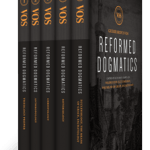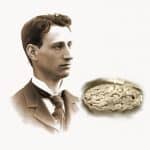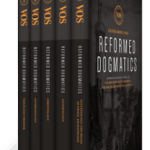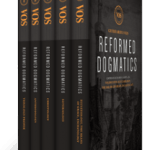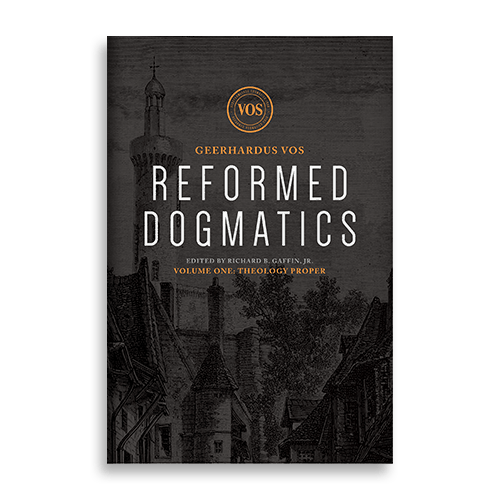
Today’s guest post was written by Daniel Robbins, associate pastor of Christ Church in Bellingham, WA. He originally wrote this review of Geerhardus Vos’?Reformed Dogmatics?for the student journal at Covenant Theological Seminary.
Vos? Reformed Dogmatics spans five volumes: Theology Proper, Anthropology, Christology, Soteriology, and the fifth covering Ecclesiology, the Means of Grace and Eschatology. While this review will only deal with the first volume, currently the first four are available in print as well as the digital format searchable from within Logos Bible Software. These represent a collaborative work of translation under the oversight of Richard Gaffin Jr. and a team of translators. Gaffin?s preface notes the provenance, ?This Dogmatiek was first published in Dutch as a hand-written manuscript in five volumes, in 1896. It was subsequently transcribed and printed in 1910. While the 1896 version is apparently in Vos? own hand, the transcription is almost certainly some other person or persons. But there is no good reason to question that it was done with Vos? full knowledge and approval. That transcription is the basis for this translation project.?
Vos taught at the Theological School of the Christian Reformed Church (later Calvin Reformed Seminary) from 1888-1893, which means he was roughly 26-31 years old. Given his youth, his prodigious production is remarkable along with his broad grasp of issues and other Reformed dogmatists before him. The format of the work fits given that he produced this work during his time lecturing on systematic theology. Instead of the discursive style found in similar works, like that of Bavinck, Vos organized his work in a question and answer format. Thus it reads almost like a study guide a student would have developed in preparation for an impending exam. Reading through each chapter can be a bit of a task in that the train of thought between one question and another is sometimes disjointed. As well, many of the answers condense into a few phrases entire debates and topics which would undoubtedly be expanded in the discussion of a classroom, similar to the way the Westminster Confession reads. The use of the book, then, is perhaps more like a reference work, or a theological dictionary. The publishers have provided a helpful index of the questions in each chapter. The best use, then, may be to simply consult the index with a particular subject in mind and consult the treatment of pertinent questions, ?Is there a connection between the eternal Sonship of Christ and His work as Mediator?? (3.69)?This first volume includes the following topical chapters: 1. The Knowability of God, 2. Names, Being and Attributes of God, 3. The Trinity, 4. Of God?s Decrees in General, 5. The Doctrine of Predestination, 6. Creation, and 7. Providence.
This is an unabashed dogmatic work, as the question quoted above betrays. In many ways it is a crystallization and fresh restatement of the tradition of the post-Reformation Orthodox, whom he references more often than theologians of his own day. His approach is ecclesial and historic. While he shows awareness of many current voices, he also uses and reveres early church contributions (3.7,8) and creeds (3.11-14).?That is to say, Vos?s dogmatics are as churchly as orthodox. Finding Vos, ?the father of a Reformed Biblical theology,? covering topics as supposedly ?esoteric? as the relation between God?s wisdom and freedom in regard to his decrees (4.3-8) may come as a surprise to those who fancy the discipline of Biblical Theology to be free of the Enlightenment?s abstracting impulse. Vos, however, finds no reason to ignore the work of reformed scholasticism, nor any great discord between the disciplines of Systematic and Biblical theology, which can be see in the preface of his mature work of 40 years later, Biblical Theology, ?[Biblical Theology] differs from Systematic Theology, not in being more Biblical, or adhering more closely to the truths of the Scriptures, but in that its principle of organizing the Biblical material is historical rather than logical.??For all this, his work here is no less exegetical. His Biblical-Theological convictions are clearly at play even early on in this work. Thus, when considering the Trinity, he insists that we must ?not seek a decisive proof? from OT texts because OT revelation was unfinished, preparatory, polemic in combatting polytheism, and thus should be read as an organic corpus, thereby avoiding anachronism. (3.1-2) He shows great interest in the internal logic and argument of various biblical passages with an eye to its relationship to the whole. Thus, in discussing the person and work of the Son, he attends to the character of the argument in Hebrews 1 (3.43-45), as well as conceptions of the Logos examined in the light of John?s intended meaning (3.39-42). He discusses Genesis 1-2 at length (6.10-53), with careful attention to varying interpretive theories, the text itself, and apologetic concerns. His balanced judgment there is timely and welcome, ?Some maintain that the theory of evolution in its entirety is contained in these chapters. This is perhaps apologetic zeal, but it is bad exegesis. Every interpretation of Genesis 1 and 2 must be justified exegetically. That science has discovered this or that, or thinks to have discovered it, is not enough to cause us to discover it in Genesis.? (6.13)
Readers interested in prolegomenal issues such as epistemology will be disappointed to find that Vos only dedicates a sparse two pages to the Knowability of God, in contrast to the entire first volume Bavinck?s Reformed Dogmatics. Rather, Vos? methodological and disciplinary concerns are interwoven into the topics addressed. Thus, while there is no dedicated treatment of epistemology or metaphysics, they are clear concerns of his. His doctrine of God, and of God?s decrees has epistemology as a central concern (1.4; 2.12, 25-26, 48-60). Speaking about the universality of scope of God?s decree, he notes, ??that to which the decree does not extend remains uncertain and would intrude in an unsettling fashion into what is certainly determined. On this all-encompassing character of God?s decree and the certainty attendant on it rests the possibility of all knowledge, for without reality as certain, knowledge is not possible.? Knowledge, for Vos, depends entirely on the scope and surety of God?s decree. Objects of knowledge must retain a fixed identity or role in the unfolding of narrative for them to be known. Tracing out the implications of a Pelagian view of freedom, he concludes they present a universe which is entirely ambivalent in nature, and thus entirely unstable, and unknowable. (4.6-7)
His familiarity with philosophical issues is clear not only in his interactions with various historic figures, but in his concern regarding pantheism, which had been revived and given a new face in the Hegelianism prevalent in the 19th century. He addresses the pantheistic errors Christians can succumb to in every chapter, (1.2; 2.37, 111; 3.15; 4.3, 8.c.5, 15; 5.4, warning of a tendency in Zwingli;) though he gives special attention to them under the headings of Creation (6.6, 16, 63.b) and Providence (7.4, 6, 12-13, 16). This reflects an awareness of the day in which he lived.
New and noteworthy concepts for this reviewer included, holiness as centripetal (2.102.b) ?as that attribute of God by which he seek and loves Himself as the highest good and demands as reasonable goodness from the creature to be consecrated to Him? (2.87). Additionally, Vos? understanding divine sonship as the ultimate form of servanthood is helpful, ?Because He is the Second Person in the Trinity and so has His personal existence from the Father, it is appropriate that of the three person He shall be the one sent, who comes to fulfill the servant-work of the covenant. The Son is therefore presented in Scripture as a servant.? (3.69) No doubt, many others could be described, but these two will give a good sampling of the kind of rich meditation awaiting readers.
This work gives us a picture into the inner working of seminary life at the end of the 19th century. There is a heavy emphasis on Historical and Ecclesial Theology, which is often not echoed today. Vos has a strong grasp not only of the history of theology but also of its development even at the ages of 26-31. As much as this may be explained by virtue of his genius, it surely says something of the training he received as well. This is a sourcebook for reflection on what was valued in Vos? day both in terms of content and approach, but also what training was desired for a professor. One wonders how our pedagogy today compares to what is on display in this work. Today, many seminaries rightly value Biblical exegesis, and Biblical theology along with an increasing emphasis on practicum and other workshop oriented classes. I suspect that many of the warnings given about the cold rationalism of the 19th century are right. However, this work is a sure reminder of the standing value and health of Historical and Dogmatic Theology, as well as the indebtedness of Biblical Theology to those disciplines.
* * *
Today, March 14, is Geerhardus Vos’ 154th birthday! Celebrate his life by learning from this profoundly influential work, recently translated into English for the first time.

